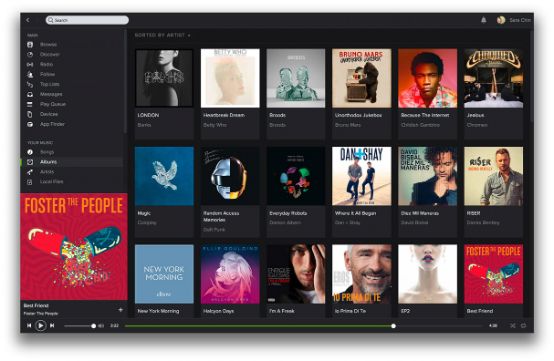Almost infinite masses of music
The German computer magazine Chip tested nine streaming services for cost, sound quality and user-friendliness.

Subscription services and ad-financed music streaming services are in vogue. The auditing firm PricewaterhouseCoopers expects sales to increase from the current 70 million euros to around 125 million euros by 2017. No musical miracle. Because with flat rates, customers benefit from an almost inexhaustible reservoir of songs for little money. Chip compared nine services and took a close look at market leader Spotify, Ampya, Deezer, Google Play Music, Juke, Napster, Rdio, Simfy and Sony Music Unlimited. The result: there are hardly any differences in the offerings. However, there are clear differences in terms of cost, sound quality and user-friendliness.
Quantity and quality
According to their own information, the streaming services have access to a standard catalog of around 20 million tracks. Providers such as Juke and Deezer have far more songs in their portfolio, with 25 and 30 million respectively. However, the number of songs available is not a sign of quality. The supposed added value often turns out to be a collection of tracks by little-known artists. What's more, not all bands are really represented on Spotify and the like: Some established groups continue to defy marketing by streaming platforms.
Which format is used for transmission (usually MP3, AAC or Ogg Vorbis) is up to the customer. The experts from Chip The bit rate also determines the sound quality. Deezer, Google Play Music, Juke, Music Unlimited, Simfy and Spotify offer a maximum bit rate of 320 kbps. This basically corresponds to CD quality. This amount of data is often reduced on mobile devices, although most services allow the settings to be adjusted up to hi-fi quality.
Test, share, pay
All streaming services offer a free trial period. Users must register with an e-mail address. With Ampya, Deezer, Juke Rdio and Spotify, this is also possible via the Facebook account. Favorite hits can then be shared with other users from the friends list. Spotify has expanded this system particularly strongly: Users can see directly in the player who has listened to what and can also play these songs. After the test phase, the customer must decide on a tariff. Prices for stationary use on the PC are just under five euros per month. Simfy is the cheapest service at 4.49 euros, while Napster represents the top end at 7.95 euros. Premium tariffs of around ten euros per month include mobile use on smartphones, iPods and tablets. Only Ampya, Spotify and Deezer currently offer ad-financed, free use, but the latter for a maximum of one year. The catch: advertising intervals of varying lengths spoil undisturbed continuous enjoyment.
The entire test report with further information on user guidance and features such as the web player and apps can be found in the 09/2014 issue of Chipwhich are available in retail and Chip Kiosk is available








